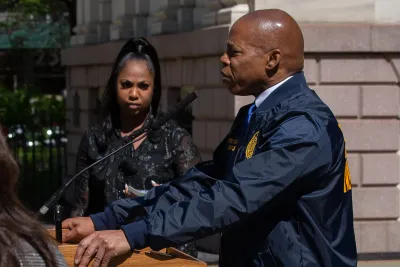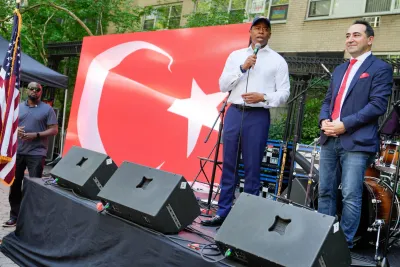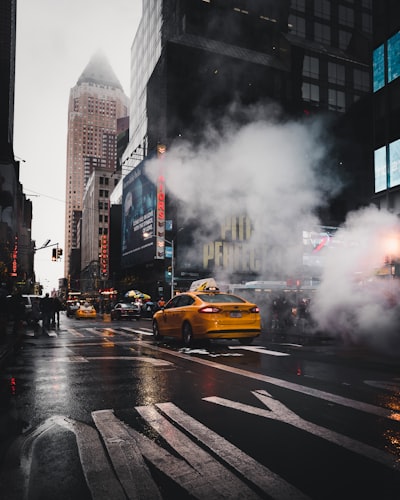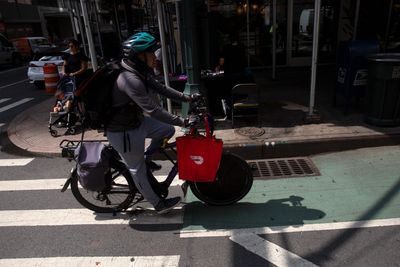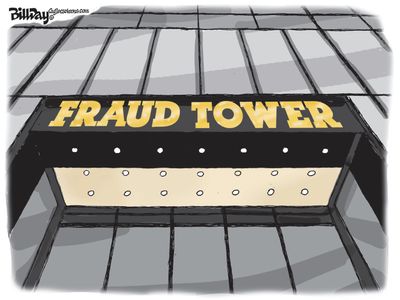Greg David, The City

This article was originally published on Feb 1 8:25pm EST by THE CITY
/cdn.vox-cdn.com/uploads/chorus_asset/file/24402387/020123_hochul_budget_2.jpg)
Gov. Kathy Hochul unveiled a $227 billion budget Wednesday that has something for everyone, and something almost everyone will dislike — especially the progressives who dominate the Democratic majorities in Albany.
The plan increases spending across the board but puts much of the $8 billion in unexpected tax revenue from the current year into reserves and tries to convince legislators that economic headwinds are likely to bring revenue growth to a halt.
Hochul proposes to bail out the Metropolitan Transportation Authority with an increase in payroll taxes paid by employers in the New York City commuter region (the city and suburbs that Metro-North and LIRR cover) and licensing fees to be paid by new gambling casinos in the city. She’s also demanding $500 million more per year from the city, while offering $300 million in new state aid.
She also urges raising the state’s minimum wage, currently $15 an hour in most of New York, by indexing it to inflation, and seeks to extend an expiring increase in corporate taxes for three years — but ignored proposals from progressive and tenant groups for big increases in state spending.
Acting Budget Director Sandra L. Beattie said caution is needed to deal with the grim forecast for the coming fiscal year, which begins April 1.
“Tax collections are expected to peak in the current year and fall in fiscal 2024, and we are harvesting the gains to prepare for the uncertainties ahead,” Beattie warned.
Filling the Reserves
The entire budget includes both state revenues and federal aid, with state-funded programs increasing by 2.4%, or $327 million, from this year’s budget, and would be balanced.
It puts half the unexpected revenue increase into the state’s major reserve funds, and another $1 billion into a debt reserve fund. The rainy-day funds will reach 15% of spending in the next fiscal year — two years earlier than the governor had previously proposed.
At the same time, the budget reduces expected revenues for fiscal 2025-2027 by almost $20 billion, opening gaps in those future budgets to $22 billion. Leading fiscal experts warn of the risks of increased spending, as Hochul’s proposal goes to state lawmakers angling to increase spending.
“The governor’s proposal usually sets the floor in negotiations with the legislature,” said Andrew Rein, president of the nonprofit Citizens Budget Commission. “All New York State leaders should focus not just on today, but on protecting generations of New Yorkers from a future downturn and self-made fiscal crises arising from unaffordable spending or counter-productive taxes.”
The MTA bailout plan, designed to close an expected $3 billion budget deficit in 2025, illustrates the governor’s on-the-one-hand, on-the-other-hand-strategy.
Both the Riders Alliance and the Permanent Citizens Advisory Committee to the MTA hailed the governor’s proposals to boost transit funding. But while city Comptroller Brad Lander praised the tax increase and diversion of casino revenues, he also strongly objected to the request for an additional $500 million in city aid to the agency.
Mayor Eric Adams said he intended to study the implications of the budget.
In an emailed statement, Adams said, “While we are reviewing the details of Governor Hochul’s budget proposal, it is clear that there are many victories worth celebrating, particularly in the areas of [addressing] serious mental illnesses, addressing our housing crisis, and strengthening the entire ecosystem of public safety.
“There are also areas of uncertainty that will require deeper review,” he said.
Tax Time
Businesses find themselves being asked to step up twice to help Hochul with her priorities.
The governor proposed the payroll tax that funds the MTA be increased from 0.3% of payroll to 0.5% of payroll, raising about $800 million annually. In addition, she sided with progressive groups by asking for a three-year extension of a corporate tax increase that was to expire this year, aiming to raise an additional $800 million to $1 billion over the next three years.
“A dedicated tax for improving transit and keeping it affordable is far more acceptable to the business community than other forms of revenue enhancers,” said Kathy Wylde, CEO of the business group Partnership for New York City — such as a proposal that would make permanent a temporary pandemic increase in the corporate franchise tax.
As for the MTA funding proposal: “We supported the original payroll tax, and we could support the increase, but we should be clear that increased taxes on jobs represent an invitation to move those jobs out of the region, unless accompanied by reforms to work rules, excessive benefits and bureaucracy,” Wylde added.
In a boon for one industry with a high profile, the governor wants to increase the state’s already generous film tax credit to 30% of qualified expenses from the current 25%, and cap it at $700 million a year instead of $450 million.
The industry is on track to soon match its economic impact in the boom year of 2019 when it accounted for about 100,000 jobs, paid $12.2 billion in wages and added $64 billion to the local economy. The local film sector faces intense competition from other states such as Georgia, which shelled out $1.3 billion worth of incentives to the film industry last year, the nation’s largest such outlay, and California, which matched New York at $420 million annually.
‘Tentative Steps’
Progressives, meanwhile, saw little to praise in Hochul’s budget proposal.
The Fiscal Policy Institute, which has made the corporate tax increase one of its priorities, criticized Hochul for asking for only a three-year extension rather than making it permanent.
Progressives called her plan to index the minimum wage increase — which is acceptable to most business groups — hopelessly inadequate.
“I think that it’s insulting, because the math shows that it would result in a mere increase of $13 a week, which is barely lunch where I come from,” said Democratic Sen. Jessica Ramos of Queens.
A bill Ramos has introduced would raise the current minimum wage of $15 to $21.25 by 2026 and then index it to inflation.
The Excluded Workers Coalition, representing gig workers and freelancers, blasted Hochul for not extending the state’s uninsurance program to gig workers and freelancers left out by the current system.
Other elements in the budget pertinent to New York City include $1 billion from the state to help the city with the cost of the influx of migrants, and $200 million in utility bill discounts for lower-income New Yorkers who currently don’t qualify for existing energy affordability programs.
“We’re very encouraged,” said Bill Ferris, AARP’s legislative representative. “She’s putting money on the table and she clearly wants to make energy more affordable for more New Yorkers.”
The Last One Percent
On the environmental front, Hochul included her cap-and-invest plan in her budget proposal, allocating to a Climate Action Fund one-third of the money raised via emissions caps on polluters. That would help utility customers pay for possible higher energy costs. But key details about how the cap-and-invest system would work are left for state entities — the Department of Environmental Conservation and New York State Energy Research and Development Authority — to determine.
The governor also included measures to allow the New York Power Authority to construct and operate renewable energy generators. The Public Power NY Coalition criticized the proposal for failing to address labor standards.
“Governor Hochul’s budget proposal takes tentative steps in the right direction, but New Yorkers deserve to go all the way,” the Coalition said in a statement. “Workers in the clean energy sector deserve prevailing wages, project labor agreements, and a true just transition and training funds.”
Hochul also outlined a $1 billion mental health initiative — less than 1% of the budget — that includes $890 million to build 3,500 units of supportive housing for people with mental illness, $60 million for psychiatric emergency programs and $18 million for 150 state-operated inpatient psychiatric beds.
The activist coalition Invest in New York, which includes the Working Families Party and Housing Justice for All, jeered the Hochul vision.
“To no one’s surprise, Governor Hochul’s budget proposal presentation continues to prioritize corporate giveaways while failing to sufficiently invest in the services and programs that keep all New Yorkers safe and thriving,” the group said in a statement.
THE CITY is an independent, nonprofit news outlet dedicated to hard-hitting reporting that serves the people of New York.

